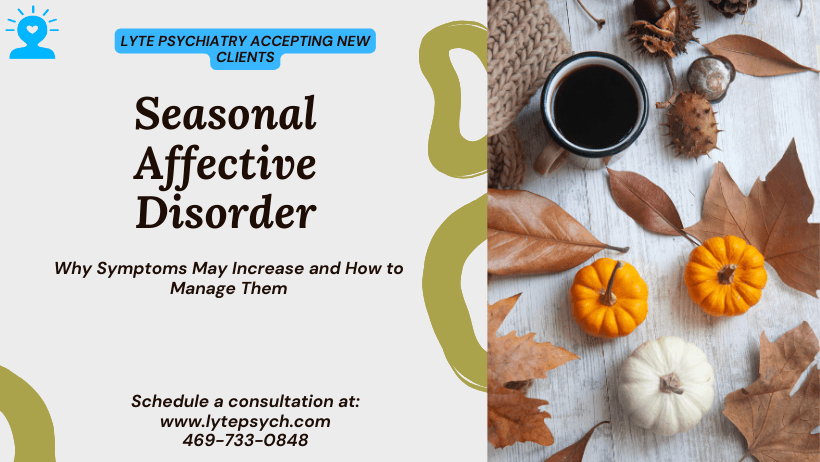Mon Oct 28 2024
Depression in the Fall: Why Symptoms May Increase and How to Manage Them at Lyte Psychiatry (Best Adults and Adolescents Therapist and Psychiatrist Near You) Affordable Therapist and Psychiatrist Near You, Dallas, TX

Depression in the Fall: Why Symptoms May Increase and How to Manage Them at Lyte Psychiatry (Best Adults and Adolescents Therapist and Psychiatrist Near You)
As the leaves change color and the days grow shorter, many people experience a shift in their mood and energy levels. For some, this transition can lead to an increase in depressive symptoms. At Lyte Psychiatry in Dallas, TX, we understand the unique challenges that come with the fall season and are here to help both adults and adolescents navigate these changes. Here’s why symptoms may increase during the fall and how you can manage them effectively.
Why Symptoms May Increase in the Fall?
Reduced Daylight Exposure The decrease in natural sunlight during the fall can disrupt our circadian rhythms and lower serotonin levels, a neurotransmitter that helps regulate mood. This reduction in light can contribute to feelings of sadness and fatigue, exacerbating symptoms of depression.
Seasonal Changes Many people find it challenging to adjust to the cooler temperatures and changes in their environment. The transition from summer to fall can evoke feelings of nostalgia or loss, leading to increased sadness or anxiety.
Changes in Routine The start of the school year and shifts in work schedules can disrupt established routines, leading to feelings of overwhelm and stress. These changes can affect sleep patterns, eating habits, and overall well-being, contributing to depressive symptoms.
How to Manage Symptoms of Depression in the Fall
Increase Light Exposure Make a conscious effort to seek out natural light during the day. Spend time outside during daylight hours, especially in the morning. Consider using a light therapy box, which can help mimic natural sunlight and improve mood.
Establish a Routine Create a daily schedule that includes time for self-care, regular meals, and physical activity. A consistent routine can provide stability and help combat feelings of chaos or overwhelm.
Practice Mindfulness and Relaxation Techniques Incorporate mindfulness practices, such as meditation, yoga, or deep breathing exercises, into your daily routine. These techniques can help you manage stress and increase emotional resilience.
Connect with Others Maintain connections with friends and family. Social support is crucial for mental well-being, so make an effort to reach out, share your feelings, and spend time with loved ones. Consider joining support groups or community activities to foster connections.
Seek Professional Help If you notice an increase in depressive symptoms that interfere with your daily life, don’t hesitate to reach out for professional support. At Lyte Psychiatry, we offer personalized therapy and treatment options tailored to your needs.
To Schedule an appointment. Click Here
To see our services. Click Here
Call us if you have question at 469-733-0848
Seek Professional Help & Schedule an Appointment at Lyte Psychiatry (Affordable Therapist and Psychiatrist Near You) Dallas, TX
Understanding the factors that contribute to increased depressive symptoms in the fall can help you take proactive steps to manage your mental health. If you or someone you know is struggling with depression, reach out to Lyte Psychiatry in Dallas, TX. Our dedicated team of therapists and psychiatrists is here to provide compassionate, affordable care and support during this challenging season.
To Schedule an appointment. Click Here
To see our services. Click Here
Call us if you have questions at 469-733-0848
FAQ
Q: What are common symptoms of depression?
A: Common symptoms include persistent sadness, loss of interest in activities, fatigue, changes in appetite, difficulty concentrating, and feelings of hopelessness.
Q: How can I differentiate between seasonal depression and general depression?
A: Seasonal Affective Disorder (SAD) is characterized by symptoms that occur during specific seasons, typically winter or fall. If symptoms improve in the spring and summer, it may indicate seasonal depression.
Q: Can lifestyle changes help with depression?
A: Yes, lifestyle changes such as regular exercise, healthy eating, and maintaining social connections can significantly improve mood and help manage symptoms of depression.
Q: How long does it take to see improvement with therapy?
A: The duration varies for each individual, but many people begin to notice improvements within a few weeks to months of starting therapy.
Q: What should I do if I feel overwhelmed?
A: If you feel overwhelmed, reach out to a mental health professional or call a crisis hotline for immediate support. It’s important to seek help when you’re struggling.